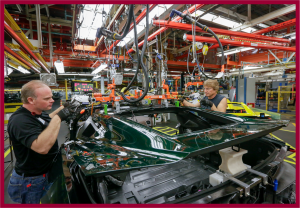
The industry shutdown scenario the closing of GM and Chrysler would have reduced U.S. employment by 2.631 million jobs in 2009 and 1.519 million jobs in 2010. The GM shutdown only scenario would have reduced U.S. jobs by 1.196 million jobs in 2009 and 675,000 jobs in 2010.
A newly released report by the Center for Automotive Research says that the auto bailouts conducted during the 2009 by the U.S. federal government saved more than 4 million jobs. It also saved U.S. taxpayers $105.3 billion in transfer payments and the loss of personal and social insurance tax collections or 768% of the net investment of the thus far $11.8 billion in unrecovered funds from General Motors and the reported loss of $1.9 billion at Chrysler for a total $13.7 billion in Treasury funds.
“Two consecutive executive administrations in Washington decided in late 2008 and early 2009 that the consequences of the potential losses and outcomes to the U.S. economy–and harmful effects to numerous employees, retirees, and business owners–were worth avoiding through a federal intervention. CAR is confident that in the years ahead this peacetime intervention in the private sector by the U.S. government will be viewed as one of the most successful interventions in U.S. economic history,” says Dr. Sean McAlinden, CAR’s chief economist, who led the analysis.
“Any complete cost-benefit assessment of the federal assistance to GM in its restructuring must consider the total net returns to the public investment,” says Sean McAlinden and Debra Maranger Menk.
CAR researchers used two separate alternative scenarios—using an economic model with actual economic performance data for the period 2009-2010 and actual employment for GM and Chrysler and for all of the automakers.
The first scenario assumed an automotive supplier sector collapse in January 2009 that continued for the balance of the year. It also assumed that industry could achieve a 50% return to production and employment in 2010 and full recovery in 2011.
The second estimate only considered the loss of employment at General Motors as a net loss for the industry in 2009 and a partial loss in 2010. This second scenario was examined by CAR as an attempt to gauge the effect of just the shutdown of GM employment and capacity on the U.S. economy without the assumption of a complete collapse of the North American supplier sector affecting all other automakers.
The industry shutdown scenario estimates that the shutdown of GM and Chrysler would have reduced U.S. employment by 2.631 million jobs in 2009 and 1.519 million jobs in 2010. The GM shutdown only scenario effect would have reduced U.S. jobs by 1.196 million jobs in 2009 and .675 million jobs in 2010.
Other benefits of the intervention that are not always taken into consideration was the direct impact on GM and Chrysler retirees, a probable permanent loss of automotive research and product development jobs, and the implications of bankruptcies of this magnitude in 2009 on the confidence of the main street economy of the United States.
The complete study is available on the CAR website, www.cargroup.org

